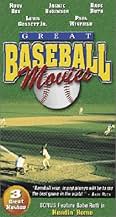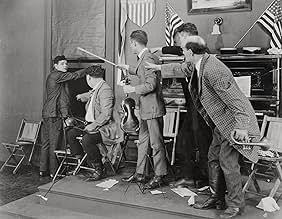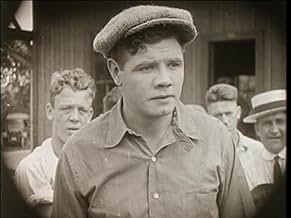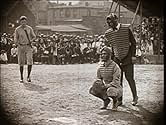The "true story" of baseball great Babe Ruth; Ruth plays himself.The "true story" of baseball great Babe Ruth; Ruth plays himself.The "true story" of baseball great Babe Ruth; Ruth plays himself.
- Director
- Writers
- Stars
Ralf Harolde
- John Tobin
- (as Ralph Harolds)
Charles Byer
- David Talmadge
- (as Charles Burt)
Ann Brody
- Mrs. Tony Marino
- (as Anne Brodie)
Sammy Blum
- Jimbo Jones
- (as Sam Blum)
Tom Cameron
- Deacon Flack
- (as Thomas Cameron)
- Director
- Writers
- All cast & crew
- Production, box office & more at IMDbPro
Featured reviews
This film which purports to chronicle the childhood of the Babe is almost entirely a fabrication....he didn't grow up in some small town....he grew up near the waterfront docks of Baltimore,MD for the first few years of his life where his father owned and ran a saloon that catered to a very rough crowd.Young George was largely unsupervised most of the time and was continually getting into one scrape or another...as a result George Sr had him enrolled in the St. Mary's Industrial School for boys and pretty much stayed out of young George's life from then on...I'm sure this film's version made for better publicity for the up and coming Babe as well as for the Yankees...Colonel Ruppert was very mindful of his team's public image and making a film about the real version of Babe's young life at that time would have had a lot of negative consequences
Boy howdy, if this isn't a trip through time, and maybe even more so than other works of the silent era. Porkpie hats galore; effusive intertitle representation of colloquial phrases, slang, and dialects that are practically another language one century later; self-mythologizing that makes T. E. Lawrence's exaggerations of his escapades look like a little white lie. And to top it all off, 'Headin' home' is a fictionalized biography that is presented as loose narrative fiction, with focus at times on tertiary figures who have nothing to do with the man himself! Very light "comedy," and very light "drama," are really nothing more than an excuse to give baseball legend Babe Ruth his own movie - and at times, it seems, to allow the folks writing the intertitles to let their imagination run wild, seemingly with the aid of several bottles of a favored alcohol beverage.
Neither Ruth, nor writers Arthur "Bugs" Baer or Earle Browne, nor director Lawrence C. Windom were a Buster Keaton or a Harold Lloyd, and this flick is no exemplar of humor or of this period in cinema. Anyone who isn't already enamored of silent films may not find anything here to change their mind. Be that as it may, it's modestly enjoyable on its own merits, and there are some small bits and pieces that are unexpectedly keen. The writers may have been imbibing a brew or five while penning the intertitles, but every now and again they slip in an especially witty line, such as a reference to the League of Nations and Woodrow Wilson's peace plan following World War I, or sly wordplay. Some scenes herein would fit neatly within a feature from a contemporary comedic icon, and for that matter - replace the central sports figure with any other actor, and at once the storytelling in 'Headin' home' would both be less noteworthy, but also right in line with most any picture of 1920. Granted, I think the story is a tad unfocused, and maybe even scattered; there are also instances where the contemporary references in the intertitles are so firmly cemented that a modern viewer can only make inferences as to the full meaning. All the same, these criticisms are no worse than can be said for what other writers have conjured.
In addition to old fashion and old language, it's striking to see depictions of period sports equipment and facilities. In every other capacity this title is well made, if unremarkable - some filmmakers were pushing the envelope and innovating in the medium, and others were happy just to have their fare sell tickets and entertain, and this is an example of the latter. It's all that it needs to be to provide a good time, though, and after all, that was the only earnest intent. It's no lightning bolt of genius, but it does actually earn a few laughs, and overall it's exactly the lighthearted fun that it wants to be. If one is a huge fan of baseball or of Babe Ruth then it will surely come more highly recommended, yet even for the casual viewer this is a splendid diversion for a quiet day. Don't go out of your way for 'Headin' home,' but if you do have the opportunity to watch, this is a fine movie that stands pretty solidly on its own feet even over one hundred years later. Not every winner needs to hit a home run, and this ably runs the bases all by itself.
Neither Ruth, nor writers Arthur "Bugs" Baer or Earle Browne, nor director Lawrence C. Windom were a Buster Keaton or a Harold Lloyd, and this flick is no exemplar of humor or of this period in cinema. Anyone who isn't already enamored of silent films may not find anything here to change their mind. Be that as it may, it's modestly enjoyable on its own merits, and there are some small bits and pieces that are unexpectedly keen. The writers may have been imbibing a brew or five while penning the intertitles, but every now and again they slip in an especially witty line, such as a reference to the League of Nations and Woodrow Wilson's peace plan following World War I, or sly wordplay. Some scenes herein would fit neatly within a feature from a contemporary comedic icon, and for that matter - replace the central sports figure with any other actor, and at once the storytelling in 'Headin' home' would both be less noteworthy, but also right in line with most any picture of 1920. Granted, I think the story is a tad unfocused, and maybe even scattered; there are also instances where the contemporary references in the intertitles are so firmly cemented that a modern viewer can only make inferences as to the full meaning. All the same, these criticisms are no worse than can be said for what other writers have conjured.
In addition to old fashion and old language, it's striking to see depictions of period sports equipment and facilities. In every other capacity this title is well made, if unremarkable - some filmmakers were pushing the envelope and innovating in the medium, and others were happy just to have their fare sell tickets and entertain, and this is an example of the latter. It's all that it needs to be to provide a good time, though, and after all, that was the only earnest intent. It's no lightning bolt of genius, but it does actually earn a few laughs, and overall it's exactly the lighthearted fun that it wants to be. If one is a huge fan of baseball or of Babe Ruth then it will surely come more highly recommended, yet even for the casual viewer this is a splendid diversion for a quiet day. Don't go out of your way for 'Headin' home,' but if you do have the opportunity to watch, this is a fine movie that stands pretty solidly on its own feet even over one hundred years later. Not every winner needs to hit a home run, and this ably runs the bases all by itself.
Babe Ruth (as Babe) helps his foster sister Frances Victory (as Pigtails) get her dog Herman out of the Dog Pound, where he is brought for having no flea license or tail lights. Mr. Ruth is heels over head in love with Ruth Taylor (as Mildred Tobin). Professionally, he wants to be a baseball player. He loves baseball more than eating. Eventually, he'll become accomplished at both. Pitcher William Sheer (as Harry Knight) is an embezzler. James A. Marcus and Ralf Harolde impress as father and son Tobin. This film is very silly.
Babe Ruth fans must have known this was all hogwash in 1920, so it's difficult to ascertain the film's point possibly, this was a proposed film about a baseball player; after Ruth signed on, the story was probably tailored for the famous baseball star. Certainly, people knew, for example, of Ruth's longer history with the Red Sox. It's interesting to see Babe Ruth as he looked back then, but the film isn't very good, and the better performances are by some of Ruth's supporting cast.
*** Headin' Home (1920) Lawrence C. Windom ~ Babe Ruth, Ruth Taylor, William Sheer
Babe Ruth fans must have known this was all hogwash in 1920, so it's difficult to ascertain the film's point possibly, this was a proposed film about a baseball player; after Ruth signed on, the story was probably tailored for the famous baseball star. Certainly, people knew, for example, of Ruth's longer history with the Red Sox. It's interesting to see Babe Ruth as he looked back then, but the film isn't very good, and the better performances are by some of Ruth's supporting cast.
*** Headin' Home (1920) Lawrence C. Windom ~ Babe Ruth, Ruth Taylor, William Sheer
Telling a simple tale of Babe Ruth's life in his small hometown just before his rise to fame, the intertitles relating the story as it is supposedly known by an "oldtimer" from Babe Ruth's birthplace of Haverlock. Following the goings-on in the town including stuff about various locals, Babe's life at home with his mother and foster-sister (an adorable little gal known as "Pigtails" who sports braids that stick out on each side of her head) and Babe's interest in a local woman who appears to be rather fickle. Babe is seen doing homespun stuff like carving baseball bats out of kindling, letting dogs loose that have been caged by the local dog catcher, and playing in a home town game, batting for the other team!
This is a mildly entertaining film - mainly of interest for the view of a young (and fairly trim) Babe Ruth, who plays himself in this. He gives a somewhat bland performance, his facial expression barely changes no matter what is happening on screen. Nevertheless, he has his charm and comes across as a real nice guy - it is certainly very interesting to see him. Some humor is attempted at in this film, via the title cards - but it pretty much falls flat. The backwoods way of speaking as told by the old man who narrates this comes across as slightly annoying - the word "wuz" is used over and over again, you get the idea. Interesting shot of a sea of men in straw hats pouring into the ball park - and I agree, Pigtails (not to mention her cute little dog) steals the film. The print of this, as seen on the Kino DVD, looks very nice, with a good deal of contrast - the music is an old-fashioned organ score that suits the film. All in all, not a great film - but for baseball and Babe Ruth fans, a must see.
This is a mildly entertaining film - mainly of interest for the view of a young (and fairly trim) Babe Ruth, who plays himself in this. He gives a somewhat bland performance, his facial expression barely changes no matter what is happening on screen. Nevertheless, he has his charm and comes across as a real nice guy - it is certainly very interesting to see him. Some humor is attempted at in this film, via the title cards - but it pretty much falls flat. The backwoods way of speaking as told by the old man who narrates this comes across as slightly annoying - the word "wuz" is used over and over again, you get the idea. Interesting shot of a sea of men in straw hats pouring into the ball park - and I agree, Pigtails (not to mention her cute little dog) steals the film. The print of this, as seen on the Kino DVD, looks very nice, with a good deal of contrast - the music is an old-fashioned organ score that suits the film. All in all, not a great film - but for baseball and Babe Ruth fans, a must see.
Babe Ruth comes from a hick town and gets involved in a lot of situations. He ends up as a baseball player.
Whoever came up with this idea should have been hit with a baseball bat. An iconic sports figure, one of the most famous of all time, is reduced to a guy growing up in the sticks, rescuing his kid sister's dog from the pound, breaking up a romance between his girl and a louse, and playing very little baseball. This might be suitable for a Charles Ray film, but not a larger-than-life sports legend. Dull in the extreme, I kept dozing off.
I tried to amuse myself by comparing scenes to other films. For instance, Babe is constantly shown whittling a piece of wood to make a bat, like Joe Don Baker in "Walking Tall."
Then, in an exhibition game in his hometown (in which he inexplicably plays for the visiting team), he breaks a bat. His kid sister then hands him his homemade bat, and he hits a homerun, like Robert Redford in "The Natural" (which of course featured Joe Don Baker as "The Whammer," a Babe Ruth knockoff).
After Ruth hits the homerun (again, for the visiting team), the townspeople chase him all over the place - like a Benny Hill sketch (absent Joe Don Baker).
The beginning of Ruth's career, as a pitcher with the Boston Red Sox, is completely ignored. We see very little footage of him playing for the Yankees, and those scenes are just thrown in without any context. Apparently, the filmmakers thought we'd be more interested in Ruth's life pre-baseball, most of which was made up. Big mistake.
Whoever came up with this idea should have been hit with a baseball bat. An iconic sports figure, one of the most famous of all time, is reduced to a guy growing up in the sticks, rescuing his kid sister's dog from the pound, breaking up a romance between his girl and a louse, and playing very little baseball. This might be suitable for a Charles Ray film, but not a larger-than-life sports legend. Dull in the extreme, I kept dozing off.
I tried to amuse myself by comparing scenes to other films. For instance, Babe is constantly shown whittling a piece of wood to make a bat, like Joe Don Baker in "Walking Tall."
Then, in an exhibition game in his hometown (in which he inexplicably plays for the visiting team), he breaks a bat. His kid sister then hands him his homemade bat, and he hits a homerun, like Robert Redford in "The Natural" (which of course featured Joe Don Baker as "The Whammer," a Babe Ruth knockoff).
After Ruth hits the homerun (again, for the visiting team), the townspeople chase him all over the place - like a Benny Hill sketch (absent Joe Don Baker).
The beginning of Ruth's career, as a pitcher with the Boston Red Sox, is completely ignored. We see very little footage of him playing for the Yankees, and those scenes are just thrown in without any context. Apparently, the filmmakers thought we'd be more interested in Ruth's life pre-baseball, most of which was made up. Big mistake.
Did you know
- TriviaBabe Ruth received $25,000 for this, his first film. The sum was a large amount for the time, and Ruth refused to cash his paycheck and carried it around to show to friends. By the time Ruth had decided to cash his check for the film, the check bounced because of the film's poor box office results. Ruth shrugged off his loss and kept the check as a memento.
- ConnectionsFeatured in Fractured Flickers: Rod Serling (1963)
Details
- Runtime
- 1h 11m(71 min)
- Color
- Sound mix
- Aspect ratio
- 1.33 : 1
Contribute to this page
Suggest an edit or add missing content























